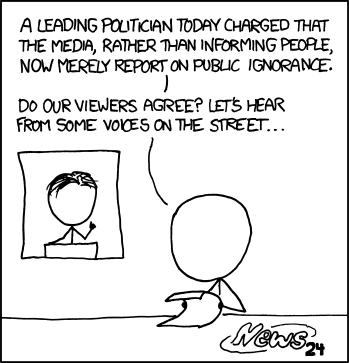
When I called the Newseum to ask about buying tickets before it opened, I asked how long it would take to go through the museum, which has five floors and over 24 hours of movies.
"We expect visitors to spend two to three hours going through the Museum," the woman on the other end of the phone said.
"What does the length depend on?" I asked.
"The size of the group."
"The size of the group, not the dorkiness of the group?"
[A slight confused pause.] "No. The size of the group."
Let it be known that the dorkiness of the group matters. (And makes for a much more critical and demanding group of visitors).
My group included four reporters and a copy editor. We entered the museum at 1 p.m. At 4:30 we had two floors to go. We decided to skip the exhibit on the Internet and see how long we could push the 5 p.m. closing time before getting kicked out. (About half an hour).
In the week since I have visited the Newseum, I've found myself increasingly describing it as "a history museum through the news".
The room that ate up an hour and a half of our time and could have warranted a full day has tons of pull out drawers that are meant to show both the progression of newspapers from booklets to today's papers and to highlight the history that newspapers have recorded.
The letter John Peter Zenger dictated to his wife to have published in the next week's journal, apologizing for the decline in quality because he was arrested.
The newspaper with the gigantic J'ACCUSE headline about the Dreyfus affair
A copy of the LA Times declaring that everyone survived the Titanic crash.
Dewey Defeats Truman.
Nixon resigns.
They have many of the greatest hits and greatest embarrassments. (Though
Ford To City: Drop Dead is noticeably absent). And, though Wonkette's slippers, the Watergate door, Anne Lander's letter opener, and Helen Thomas' clothes seem bizarre, some of the other paraphernalia --a reporter's kit from the civil war that includes a flask, a notebook page from a Newsweek reporter with the words "Monica Lewinsky" underlined at the top, and a page of Bob Woodward's Watergate notes, to name a few--were enough to evoke awe from the and opened mouths from me and my journalists friends.
But while the museum conveys a lot of respect for newspapers, media, and the journalists that put their lives on the line (a video tribute to a photographer killed when the Twin Towers fell is particularly moving) a visitor could come out of the museum still believing that newsrooms are smoke filled and that journalists use typewriters.
Short of a virtual "be a reporter" computer game there is nothing that actually conveys the day to day work of a reporter. No explanation of the editing process, no modern printing presses (or photos of them for that matter).
And, as one of the reporters I was with pointed out, while there is an excellent exhibit of Pulitzer Prize winning photographs, there is no where where you can read amazing articles from beginning to end. (The front pages don't jump and the set up is not conducive to reading the whole thing. Instead they effectively send a tingle of respect and history through the spines of interested visitors). The museum could benefit from a reading room and a place to listen to broadcasts.
One element of a journalists life was inadvertently conveyed -- the jolt of moving from one news story to another, from tragedy to triumph. While
the Sept. 11 exhibit is moving and opens onto a walk way so there is time for contemplation,
the memorial to journalists who were killed while reporting is next to the broadcast exhibit, and can feel like a walk-through. It is not conducive for quiet contemplation. In the excellent
Pulitzer winning photos exhibit, there is a movie plays in which an interview with the photographer who took the photo of the
Vietnamese man about to be shot is followed by an interview with the photographers who took the photos at the Atlanta Olympics. For a museum that had enough attention to detail to cleverly puts corrections and misleading headlines in all of the bathrooms, the lack of time for reflection in places where it was needed seems like a glaring oversight.
The First Amendment exhibit should have delved deeper into some of the cases so that even people who had taken Con. Law 101 could have learned something, the map of where free press exists was appropriately anger evoking and the mini-profiles of the men and women who wrote despite restrictions felt like teasers to longer stories but duly evoked deep respect for the journalists. I loved that both the Pentagon papers and the arm band that spurred Tinker V. Des Moines were on display .
Despite my criticisms, I would go back for many more visits. I didn't get a chance to watch the movies that look at individual parts of journalism history--such as coverage (or lack thereof) of the civil right movement-- or elements of putting out a newspaper--such as questions of bias. And I would love to spend a whole day in the News History Gallery.
I just hope that the Newseum uses its promised temporarily exhibits to fill in some of the holes.
Oh and while they're at it, a discount for working journalists wouldn't hurt.
Photo from a Facebook ad for the Newseum. The ad is also in the Metro. Does anyone else think it's weird that it seems to imply that the White House is in East Germany?






